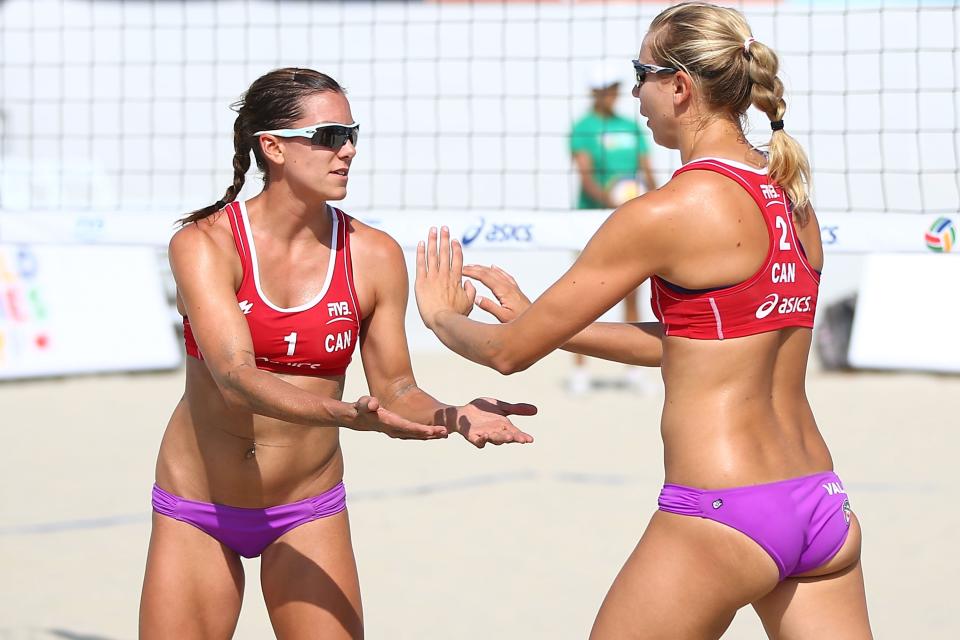For Canadian beach volleyball pair of Broder and Valjas, all roads lead to Rio

If all goes to plan for the Canadian beach volleyball pair of Jamie Broder and Kristina Valjas, their visit to Brazil this month won’t be their last this year.
Broder, from Victoria, and Toronto’s Valjas open competition today at the FIVB Maceio Open looking to build on an impressive 2015 season that has put them in a good position to qualify for the women’s competition at this summer’s Rio Olympics.
After opening last season in April with a win at an open event in China, the team added a bronze medal in the next event in Switzerland to go along with other near-podium finishes in other events as they spanned the globe playing on four continents.
“You couldn’t have asked for a better starting event, winning gold,” Broder told Yahoo Canada Sports earlier this year, when the team was training at the Volleyball Canada facility at Downsview Park in Toronto. “We put in so much work in every off-season and every year that we’ve played that we’ve been building towards this so to see it come to fruition and have it be at the start of the Olympic qualification was definitely pretty perfect.”
The win in China was the first-ever medal by a Canadian team on the FIVB World Tour and helped put them on top of the Olympic qualifying rankings, which they held for the first part of the season. Heading into the new season they’re ranked No. 8, and with the top 16 earning berths when the spots are finalized in mid-June their qualification is almost assured.
Canada’s top-ranked women’s team, Heather Bansley and Sarah Pavan, are ranked fourth and start their competitive season in a few weeks.
Apart from Mark Heese and John Child’s bronze medal from Atlanta, when beach volleyball was first played at an Olympics in 1996, Canada has had limited success in beach volleyball. And on the women’s side, Canada has never qualified more than one team – If both of Canada’s high-flying women’s teams qualify, it would be the first time reaching the maximum quota of two teams per country.
Broder and their coach John May are keeping track of other teams’ results, but there will be no doubt of qualification if their good results persist.
The success could not have happened at a better time, as the prize money compensated for a funding shortfall. Sport Canada has not given the team full carding heading into the Olympic year.
“We had a really awesome season last year and I think we made the most money we ever had in a year, which is really helpful,” said Valjas, whose brother Len competed for Canada in cross-country skiing at Sochi in 2014. “But leading up to that, we had to invest our own finances and find sponsors and get to where we are now.”
Broder added: “Things haven’t changed in terms of sponsorship but only because I think beach volleyball is quite a new sport in Canada. It doesn’t have that visibility. People now are starting to hear about the Canadian beach program and hearing about our success but it’s taking a little while to catch up.”
During the conversation, Broder completed Valjas’ sentences and vice-versa on a number of occasions. That’s not surprising considering how much time they spend together. While on tour, they share hotel rooms and long-haul flights between events.
It could push even the strongest relationships but this team has been together since the end of 2011. In a sport where teams can come together and fall apart, they have found a chemistry that they think could take them to Rio this summer.
“She’s very supportive as a partner. When I’m down, she’s usually the one to have my back and helping me through it rather than being aggressive and harpy,” said Broder. “So she’s very supportive in that way but she also has an aggression to her in the moment where she wants to win.”
Valjas, meanwhile, calls Broder a “sweet, girl-next-door” type off the court, but on it, she’s completely different.
“She’s the captain so she’s the only one allowed to talk to the referee,” said Valjas, who added that on the court Broder doesn’t often say much but has a quiet intensity that can sometimes erupt.
“She’s gotten red cards, yellow cards, she’s punted a ball. She has this side to her that’s completely opposite to the day-to-day Jamie.”
In Maceio this week, Broder and Valjas are in a pool alongside pairs from Brazil, Austria and Russia. The top three teams qualify for the knockout round.
They’ll remain in Brazil for the next event, which is a Grand Slam in Rio at the Copacabana Beach, the same venue as the Olympics. Compared to Maceio, which is an “open” event, the Grand Slam has much higher prize money and has a greater effect on Olympic rankings.
“We’re happy with where we are but we’re definitely not comfortable by any means,” said Broder. “We want the best possible rank heading into the Olympics.”

 Yahoo Sports
Yahoo Sports 


